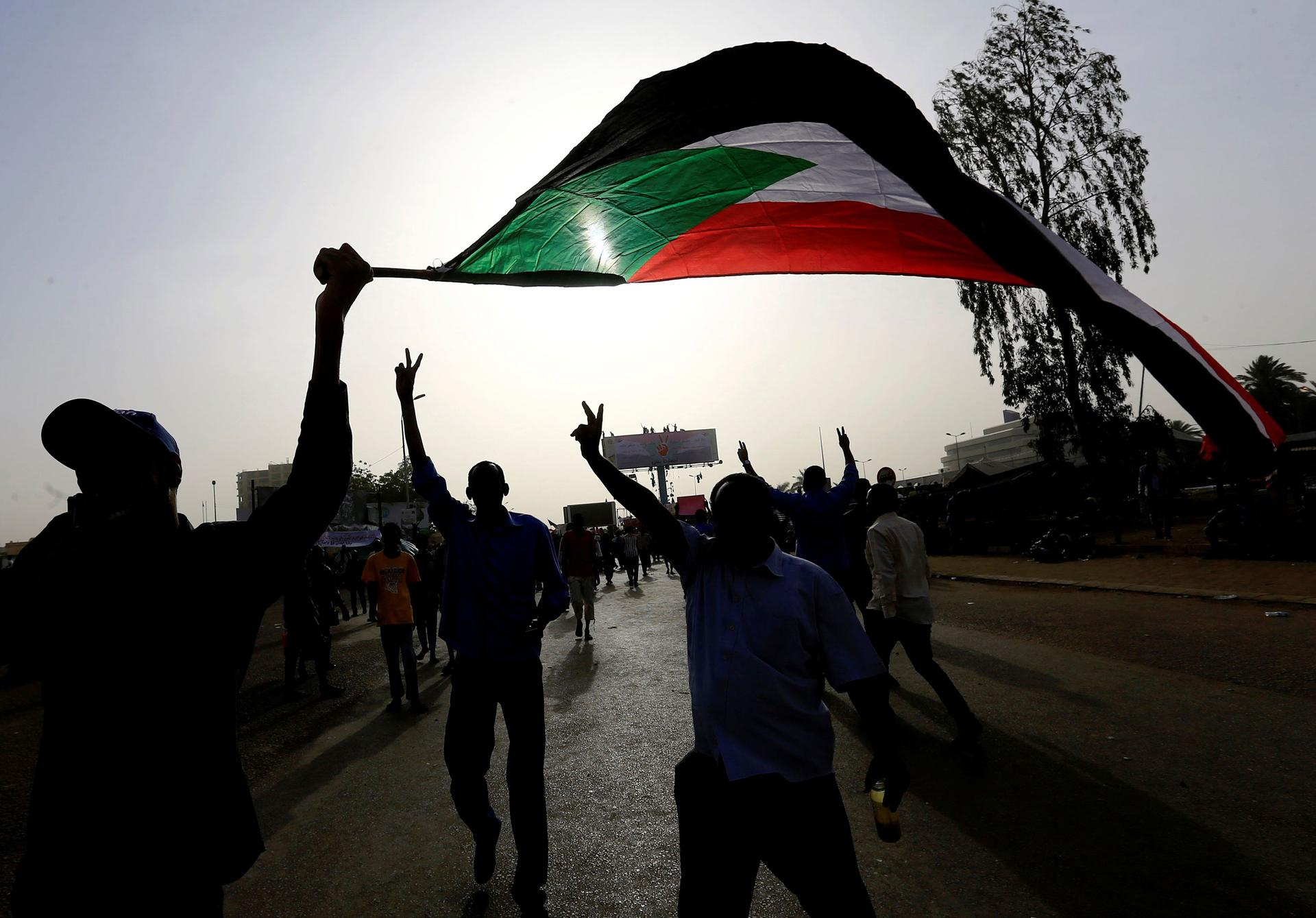Bashir is out in Sudan, but ‘protesters are not satisfied’ with military rule
A military officer is carried by the crowd in Khartoum, Sudan, as demonstrators chant slogans and carry their national flags after Sudan’s Defense Minister Awad Mohamed Ahmed Ibn Auf said that President Omar al-Bashir had been detained “in a safe place” and that a military council would run the country for a two-year transitional period.
President Omar al-Bashir, who ruled Sudan in autocratic style for 30 years, was overthrown in a military coup on Thursday, but protesters’ jubilation was short-lived as they took to the streets demanding military leaders hand over power to civilians.
Bashir, 75, had faced 16 weeks of demonstrations against his rule. Announcing the ouster, Defense Minister Awad Mohamed Ahmed Ibn Auf said Sudan would enter a two-year period of military rule to be followed by presidential elections.
Ibn Auf announced a state of emergency, a nationwide ceasefire and the suspension of the constitution. Seated on a gold-upholstered armchair, he said Sudan’s airspace would be closed for 24 hours and border crossings shut until further notice.
The main organizer of protests against Bashir, the Sudanese Professionals Association (SPA), rejected the minister’s plans. It called on protesters to maintain a sit-in outside the defense ministry that began on Saturday.
Related: Here’s the story behind the iconic image of the Sudanese woman in white
Shortly afterwards, tens of thousands of demonstrators packed the streets of central Khartoum, their mood turning from celebration over Bashir’s expected departure to frustration at the announcement of the military-led transition.
National flags were waved over the vast crowds, which included families, women and people of all ages. “Fall, again!” many chanted, adapting an earlier anti-Bashir slogan of “Fall, that’s all!” Some wrote anti-Ibn Auf slogans on their clothes.
Rebecca Hamilton, an assistant professor of law at American University in Washington, DC, served as a lawyer in the International Criminal Court and worked on cases in Sudan. She is a former journalist and the author of “Fighting for Darfur: Public Action and the Struggle to Stop Genocide.” She spoke to The World’s Marco Werman about the history of Sudan and Bashir’s rule.
Marco Werman: What is your understanding of what led the Sudanese military to stage a coup and remove Omar al-Bashir and arrest him?
Rebecca Hamilton: This has happened as a result of extraordinarily courageous protest by the Sudanese people. The latest iteration of these protests began back in December, and they have continued despite people being detained, tortured and just faced a whole lot of other consequences for continuing their protests. But ultimately, the protests have become overwhelming, and it seems that Bashir saw the writing on the wall.
The fact that those protesters were not stopped by the Sudanese military — what does that tell us about Bashir’s relationship to the military?
Well, it’s really interesting because Bashir has always had an extremely close relationship to the military and that is one of the things that has enabled him to stay in power for this long. But I think the military saw with just the strength of the protests — and the breadth of the protests is the other thing — this was not just from a narrow section of the Sudanese population. It was really from across the whole country, saw that the protesters which is not going to accept Bashir staying in power. And I think that is why they have moved to take control. It should be noted though that they are taking control for themselves. This is not a transition to democracy, and the man who is currently in charge, the previous vice president now in control of the Sudanese government, Awad Ibn Auf, he himself has a lot of blood on his hands and is, in fact, sanctioned by the US for atrocities in Darfur.
Let’s put the current events on pause for a moment to go back and talk about Omar al-Bashir the man. What’s a thumbnail sketch on Bashir and his impact on Sudan?
What we’ve witnessed this morning is, in fact, the fifth military coup in Sudanese history since it gained independence from Britain back in 1956 and Bashir, who was in charge of the fourth military coup back in 1989, has managed to survive and retain control of this country for 30 years. And he’s only been able to do this by being a very sophisticated political operator.
For the longest time, he was able to use the wealth of the state to develop a patronage system, to manage to keep potential rivals happy enough.
But in 2011, when South Sudan voted to become an independent nation, what they took with them was the vast oil revenues that Sudan had been using and that Bashir himself had been using to help keep himself in power. And since then, we’ve seen a decline in the Sudanese economy and Bashir losing the ability to maintain the patronage system that had helped him stay in power for so long.

So, he survived his relationship with Osama bin Laden. He survived the heat he got for Darfur, but it was ultimately the economy, it sounds like, that was his undoing?
I think that coupling of the economy with just the sheer courage of the protesters, in addition to obviously being able to develop this patronage system. The other mechanism that he had was not only the military but the brutal and feared security services in Sudan that are known for just detaining people for any sign of opposition against the government, for any sign of protest and routinely torturing dissidents.
Related: How Sudan’s uprising is inspiring Sudanese American teens
So, Sudan is at a strange impasse. On the one hand, Omar al-Bashir is out. But the defense minister has now declared a three-month state of emergency and imposed a curfew. What does this mean for the arrival of democracy, which is what brought the protesters into the streets in the first place?
The protesters are not satisfied by these developments. Obviously, they’re an incredible first step, and everyone is heartened by that. But this is not what people have been protesting for. They are looking for a transition to true democracy, and military rule was not that.
History here does not give us a lot of encouragement. When we look at the past military coups, there was, back in 1985, a transitional military government that for once in Sudanese history did allow democratic elections. And so, in 1986, we had a democratically elected president. But it was actually the military coup led by Omar al-Bashir in 1989 that took power from that democratically elected president.
I think one of the challenges for people to understand is that this is not just about who is the individual in charge of Sudan. Sudan’s real challenge and what the protesters have been fighting for is for a state that will actually represent all the citizens of Sudan. And that is the goal here — a true democracy where it doesn’t matter whether you come from Darfur or Blue Nile or the Nuba mountains. If you are Sudanese, a state should represent you and that is going to be a longer struggle than simply the replacement of Omar al-Bashir.
This interview was condensed and edited for clarity. Reuters contributed to this report.
Every day, reporters and producers at The World are hard at work bringing you human-centered news from across the globe. But we can’t do it without you. We need your support to ensure we can continue this work for another year.
Make a gift today, and you’ll help us unlock a matching gift of $67,000!
